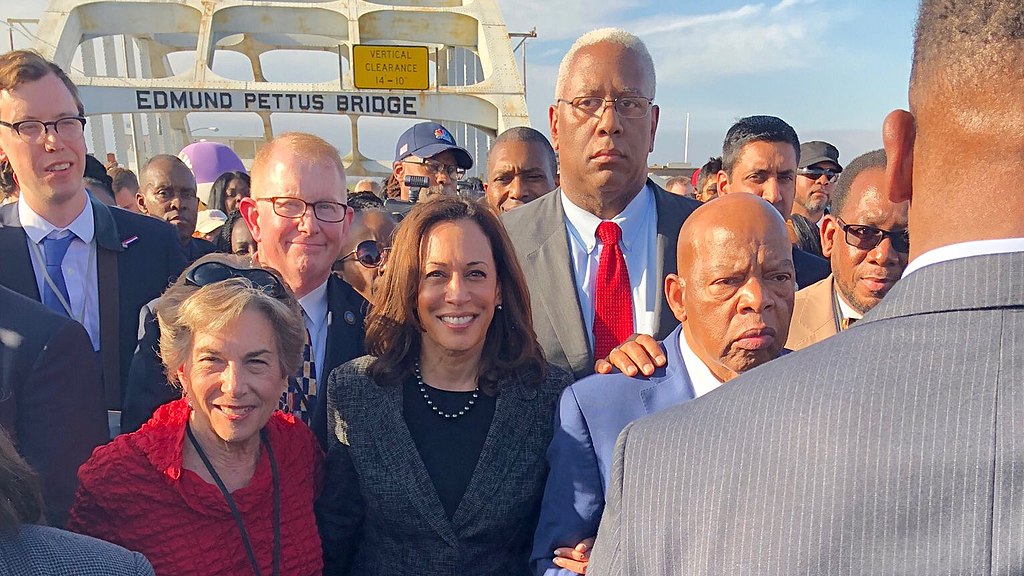In a surprising accusation, conservative activist Laura Loomer claimed that Vice President Kamala Harris has allegedly devised an unconventional method to get more men to the polls: targeting them through dating apps. The assertion, which has sparked both amusement and criticism online, suggests that Harris’s team is using women on dating apps to encourage men to vote, a tactic Loomer labeled as "bimbo tactics."
Loomer’s tweet, which surfaced just minutes ago, reads, “Wow! @KamalaHarris is now having bimbo women target men on dating apps to get them to the polls. This was sent to me by one of my male friends." The claim, though unverified, has quickly gained traction on social media platforms, with users speculating about the validity and effectiveness of this supposed approach.
While Harris’s team has not addressed Loomer’s accusation directly, political analysts suggest that if true, this strategy could reflect an effort to engage young male voters who are historically less likely to turn out in midterm elections. Recent polls indicate that while young women are increasingly voting, young men often exhibit lower turnout rates, prompting campaigns to explore unconventional methods of voter engagement.
Some social media users responded with a mix of humor and disbelief, questioning the feasibility of such a strategy and whether it could truly impact voter turnout. One Twitter user quipped, “Guess the new dating profile question is ‘Are you voting this November?’” Another joked, “Dating apps have officially entered the campaign trail. What’s next, campaign ads on Tinder?”
While dating apps have previously been used by campaigns to advertise and target demographics, the suggestion that they could be used to directly sway individuals through one-on-one interactions is a new level of targeting. Political expert Dr. Amanda Lee remarked, “If the claim holds any weight, it signals how creative – and bold – modern campaigns are willing to get to reach voters. This may also indicate the increasing importance of the digital and personal spaces where young voters spend much of their time.”
Despite the lack of confirmation, the alleged tactic has fueled debates about campaign ethics. Critics, primarily from conservative circles, argue that using dating apps to push political agendas can be perceived as manipulative. “It crosses a line,” Loomer emphasized in follow-up tweets, “especially if men are being unwittingly dragged into political discussions when they’re just looking to meet someone.”
Campaign professionals, however, note that targeted social outreach has been a part of modern election strategies for years. From social media platforms to targeted ads, the tactics have evolved with technology, though using dating apps specifically is an unexplored method.
For now, Loomer’s claim remains an unverified accusation that continues to stir online discourse. Whether Kamala Harris’s campaign team will address or debunk the claim is yet to be seen, but the incident highlights the increasingly creative, and at times controversial, ways in which political campaigns are willing to adapt their approaches to reach voters in the digital age.



 Dominican Republic Unveils Massive Rare Earth Deposits to Boost High-Tech and Energy Sectors
Dominican Republic Unveils Massive Rare Earth Deposits to Boost High-Tech and Energy Sectors  Netanyahu Suggests Iran’s Supreme Leader Khamenei May Have Been Killed in Israeli-U.S. Strikes
Netanyahu Suggests Iran’s Supreme Leader Khamenei May Have Been Killed in Israeli-U.S. Strikes  Iran Supreme Leader Ayatollah Ali Khamenei Killed in Israeli, U.S. Strikes: Reuters
Iran Supreme Leader Ayatollah Ali Khamenei Killed in Israeli, U.S. Strikes: Reuters  Trump Orders Federal Agencies to Halt Use of Anthropic AI Technology
Trump Orders Federal Agencies to Halt Use of Anthropic AI Technology  HHS Adds New Members to Vaccine Advisory Panel Amid Legal and Market Uncertainty
HHS Adds New Members to Vaccine Advisory Panel Amid Legal and Market Uncertainty  Pentagon to Halt Ivy League Programs for U.S. Military Officers Starting 2026
Pentagon to Halt Ivy League Programs for U.S. Military Officers Starting 2026  Germany and China Reaffirm Open Trade and Strategic Partnership in Landmark Beijing Visit
Germany and China Reaffirm Open Trade and Strategic Partnership in Landmark Beijing Visit  Trump to Address Nation as U.S. Launches Strikes in Iran, Axios Reports
Trump to Address Nation as U.S. Launches Strikes in Iran, Axios Reports  Venezuela Oil Exports to Reach $2 Billion Under U.S.-Led Supply Agreement
Venezuela Oil Exports to Reach $2 Billion Under U.S.-Led Supply Agreement  Federal Judge Blocks Virginia Social Media Age Verification Law Over First Amendment Concerns
Federal Judge Blocks Virginia Social Media Age Verification Law Over First Amendment Concerns  Argentina Senate Approves Bill to Lower Age of Criminal Responsibility to 14
Argentina Senate Approves Bill to Lower Age of Criminal Responsibility to 14  ICE Hiring Surge Raises Vetting Concerns Amid Rapid Expansion
ICE Hiring Surge Raises Vetting Concerns Amid Rapid Expansion  Israel Declares State of Emergency as Iran Launches Missile Attacks
Israel Declares State of Emergency as Iran Launches Missile Attacks  Trump Warns Iran as Gulf Conflict Disrupts Oil Markets and Global Trade
Trump Warns Iran as Gulf Conflict Disrupts Oil Markets and Global Trade  USITC to Review Impact of Revoking China’s PNTR Status, Potentially Raising Tariffs on Chinese Imports
USITC to Review Impact of Revoking China’s PNTR Status, Potentially Raising Tariffs on Chinese Imports  Trump Floats Ted Cruz for Future U.S. Supreme Court Nomination
Trump Floats Ted Cruz for Future U.S. Supreme Court Nomination  U.S.-Iran Nuclear Talks Show Progress but No Breakthrough Amid Rising Military Tensions
U.S.-Iran Nuclear Talks Show Progress but No Breakthrough Amid Rising Military Tensions 































